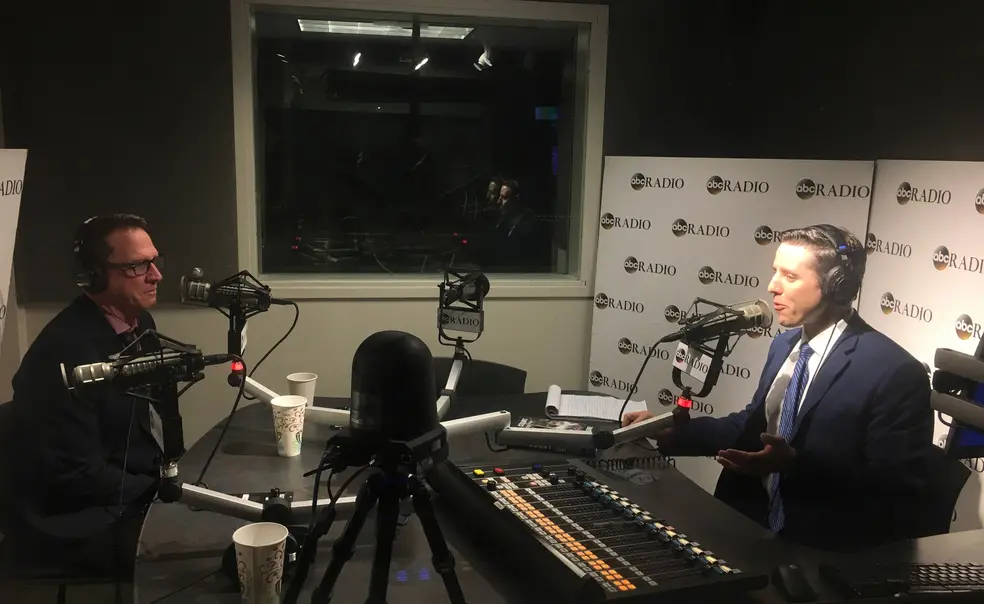Podcast Spotlight: Rick Klein ’98 Lifts the Curtain on Politics
Rick Klein ’98 is a powerhouse in political journalism. As the political director for ABC News, he plays a big role in steering the network’s coverage while also continuing his own reporting and interviewing major political figures. On top of that, he co-hosts the Powerhouse Politics podcast with ABC’s chief White House correspondent, Jonathan Karl. Every week, the two journalists take listeners behind the scenes in Washington.
“I’ll tell you: The most fun I have at work every week is recording that podcast,” Klein says. “I feel like it’s a different way of conveying our passion for what we do and the knowledge of what we’re covering.”
Where It All Started
“The first campaign event that I covered was actually for the Prince in 1996 when Bill Clinton came to New Jersey for a campaign stop, and I did an interview on campus with Steve Forbes [’70], who was running for president. I was a kid that was fascinated by politics, and when I got to Princeton, I gravitated toward the Prince because I just loved the energy of a newsroom, the excitement of being in the middle of the action. I was a politics major — surprise! — and most of the stuff that I did outside of the classroom was the Prince and WPRB. I was the editor-in-chief of the Prince and I spent many a night in our production room, many a night covering USG meetings and the goings-on on campus, editing stories, and broadcasting sports for WPRB. What I’m doing now sits at the nexus of those two extracurriculars in a really cool way, especially with regard to the podcast.”
Framing Powerhouse Politics
“For us, the most important value we can bring is a little peek behind the curtain as to how we operate, how the reporting is produced, how the information is disseminated. We don’t feel a need to recap every headline. We feel a need to hit the news with some of the details that you may not have gotten if all you did was read my story or see us on TV — a little bit of insight about how that interview came to be, or what it was like to be in the room for that moment, or what the smart people are telling us that it really means. But I’ve always said to people: I don’t expect that the only news you’re getting is from us, from either our podcast or our online reporting or our TV reporting. I respect and expect that people are reading lots of different sources.”
The Joy of Podcasting
“There have been times where the podcast has been kind of a personal outlet or release. I’m not saying anything I wouldn’t be saying on air, I just don't often have the opportunity to say it or to write it in the same way. There’s something about that conversation that can be really important to the rest of my job. I’ll often say something prompted by the conversation, then I make a note to myself that I need to follow up on it later on. The process of having that conversation can kind of open up different avenues of reporting and different insights.
“Look, I love talking about politics. That’s what I do, that’s who I am on the professional level, so having the ability to do that for half an hour or so once a week — have it recorded and out there with relatively few restrictions as to what we do and how we do it — is very cool. I hope people feel like they got something they didn’t get anywhere else. I hope that you’re able to say, ‘I didn’t think of it that way’ or ‘I didn’t recognize that was going on’ or ‘I didn't really know who that person was or what that was really about.’ If you walk away just the tiniest bit smarter about politics, then that, to me, is mission accomplished.”
Covering President Trump
“I think every president communicates in unique ways. This president is very much a creature of media culture and is a voracious consumer of the news. He watches what we put on TV, he knows the individuals in the briefing room, he knows the people that are asking questions of him. I've interviewed him a few times — I interviewed him a month or so before he became a candidate, and every time I interacted with him since then, he referenced that interview. He remembered it, and I think he has that kind of relationship with a lot of reporters.
“He uses us as foils often, and he jousts with the press on a pretty regular basis. But there’s no president I’ve covered or seen in Washington who is as interested in and engaged with what is being said about him, what the coverage looks like. When he calls us fake news, he's watching the news. It’s an interesting time to be a Washington reporter for so many reasons, but the interplay and the exchanges with journalists are certainly unlike anything we’ve ever seen.”
Tiger Streak
“Podcasting is very individual but it’s also very much a team sport, and we have a great group of producers and radio editors who are part of this. The extended team at ABC News is all offering us ideas and helping us book guests, our political reporters are part of this day in and day out, and it is cool to work with Avery Miller, Class of 1990, putting this together. We didn’t know each other until I got to ABC News but she’s become a very good friend, she’s a terrific producer, and she’s careful to note for me any potential Princeton connection that we can make on air.”












No responses yet